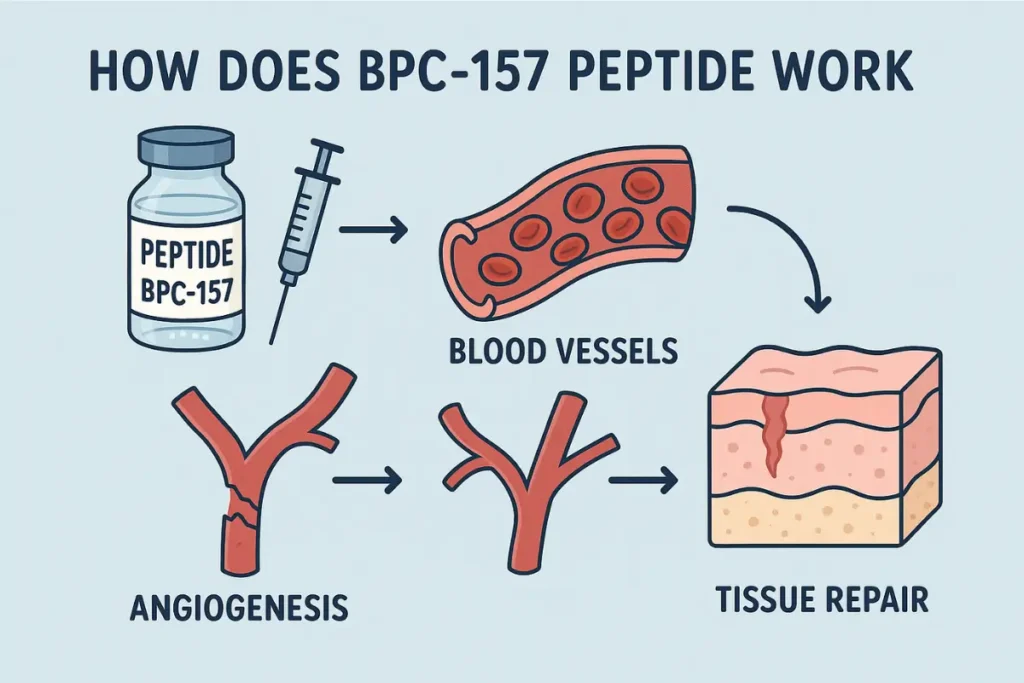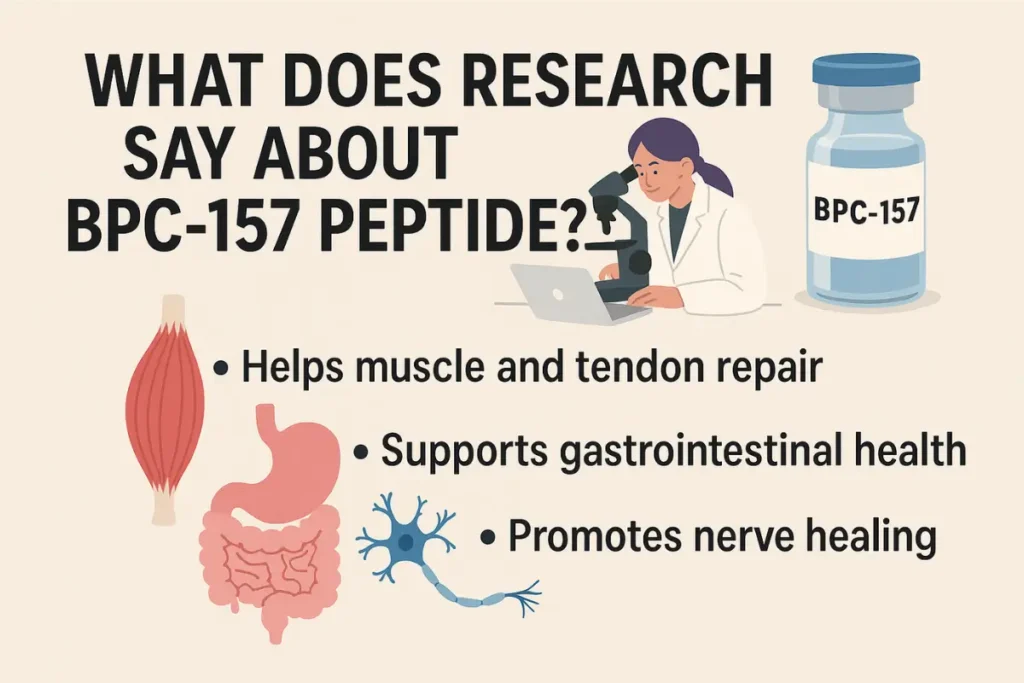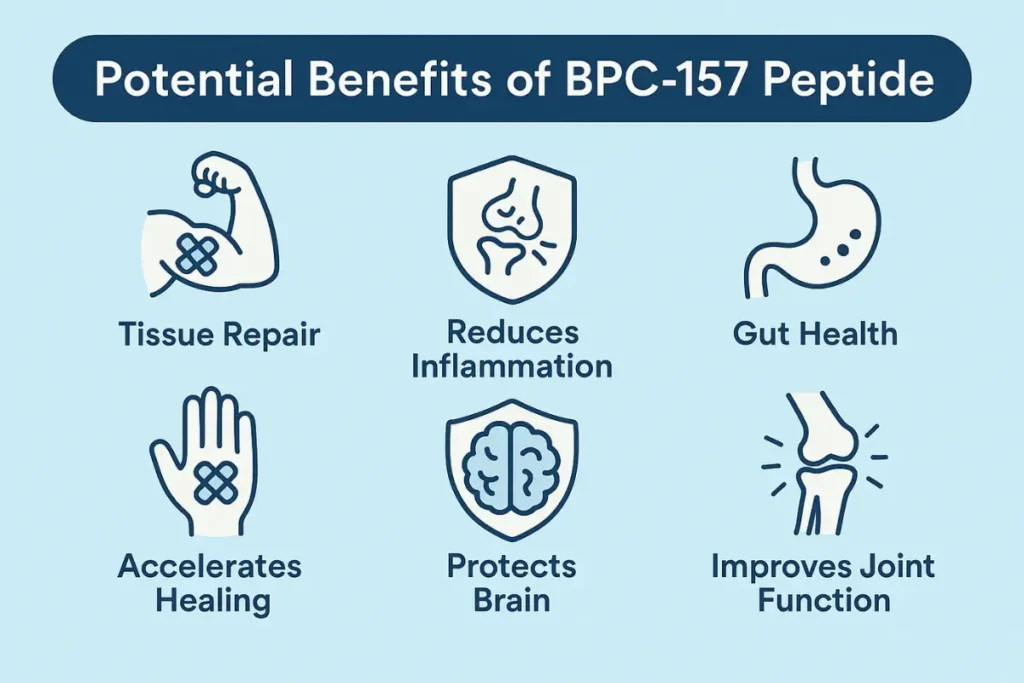BPC-157 Peptide: How It May Help With Healing and Tissue Repair
BPC-157 peptide is a special compound that scientists are studying for its possible benefits in healing injuries. Research shows this peptide may speed up tissue repair and reduce pain. It also supports faster recovery from injuries. In this article, we will explore what BPC-157 peptide is, how it may work, and the research that supports its use.
What Is BPC-157 Peptide?
BPC-157 stands for Body Protection Compound-157. This synthetic compound contains a chain of 15 amino acids. Such peptides support protein development by mimicking natural amino acid sequences. Scientists created BPC-157 from a protein found in the human stomach. Scientists are studying it for its potential healing and recovery benefits.

How Does BPC-157 Peptide Work?
Scientists are still studying how BPC-157 works, but early research points to several possible benefits. This is how it may support the body in healing itself:
Promotes Healing of Tissues
BPC-157 influences tissue restoration, potentially shortening recovery times. Animal studies suggest BPC-157 may support angiogenesis (the formation of new blood vessels). This is important, as new blood vessels help deliver oxygen and nutrients to the damaged area. Poor circulation can significantly delay the tissue healing process.
Reduces Inflammation
For example, inflammation occurs when the body is injured or infected. It can cause swelling, pain, and redness. BPC-157 may help reduce inflammation, making it easier for the body to heal.
Protects Cells
Some studies suggest that BPC-157 can protect cells from damage. This may play a key role in recovery after an injury. Damaged cells can delay and disrupt the body’s natural healing process. By protecting the cells, BPC-157 may help speed up the process.

What Does Research Say About BPC-157 Peptide?
Research on BPC-157 peptide is still in its early stages, but some exciting results have been observed. Research has highlighted the following significant findings:
Helps Muscle and Tendon Repair
In animal studies, BPC-157 has been shown to help muscles and tendons heal faster. Healing in these tissues is usually a lengthy process following injury. BPC-157 may speed up this recovery process by improving blood flow to the area and promoting the growth of new tissue.
- Muscle Healing: Some studies suggest that BPC-157 can help muscles recover after injury.
- Tendon Healing: Tendons, which connect muscles to bones, usually heal slowly. BPC-157 may help tendons heal more quickly.
Supports Gastrointestinal Health
Additional studies suggest that BPC-157 may help protect and repair the gastrointestinal (GI) tract. It has been shown to promote healing in stomach ulcers and protect the lining of the intestines. This could be beneficial for people who suffer from conditions like ulcers or inflammatory bowel disease.
Promotes Nerve Healing
Nerve injuries can be difficult to treat, and nerves can take a long time to heal. Some studies suggest that BPC-157 promotes nerve regeneration. It might support faster rehabilitation in cases of nerve trauma.

Potential Benefits of BPC-157 Peptide
While research is still ongoing, here are some of the potential benefits that studies have suggested:
- Faster Recovery from Injuries: BPC-157 may accelerate recovery from muscle, tendon, and joint injuries.
- Reduced Pain and Inflammation: BPC-157 exhibits anti-inflammatory effects. This may help reduce pain after injury.
- Improved Healing in the Gut: BPC-157 may aid in faster healing for conditions like ulcers and Crohn’s disease. It could also help relieve related symptoms.
- Nerve Regeneration: It might help nerve tissues heal after injury, making it useful for people with nerve damage.
Is BPC-157 Safe?
As with any supplement or peptide, it is important to consider safety. BPC-157 peptide has not received FDA approval for use in humans. It is only available for research purposes. Most studies on BPC-157 have been done on animals, not humans. As a result, its efficacy and safety in people remain uncertain.
Some people use BPC-157 outside of research settings. However, it is not recommended without the guidance of a medical professional. While animal studies are helpful, their results may not fully translate to humans.
Our Commitment to Quality and Research Integrity
We are committed to providing the highest quality research compounds by partnering exclusively with ISO 9001:2015 and GMP-certified manufacturers, ensuring purity levels exceed 99% in every product. We understand the critical need for high-purity research materials and the importance of independent verification through rigorous third-party testing.
Our priority is to support researchers with exceptional quality and reliability. As we expand our catalog, we conduct phased testing to maintain our high standards. Stay informed on the latest lab testing and quality updates as we continue to uphold our commitment to research excellence.
FDA and Legal Status
BPC-157 remains unapproved by the FDA for applications in humans. It is still considered a research chemical, and using it outside of a research setting is not allowed. WADA has included BPC-157 on its list of substances prohibited in sports. This means that athletes should avoid using it if they are subject to drug testing.
Conclusion
BPC-157 peptide is under early-stage investigation for its possible biological effects. It shows promise for tissue repair, reducing inflammation, and speeding up recovery. Early research suggests BPC-157 may benefit people with muscle injuries and tendon damage. It could also help with gut problems and nerve injuries. Most research has been conducted in animals, so more studies are needed. This will help us fully understand how BPC-157 works in humans.
Before using BPC-157 or any peptide for healing, it’s essential to consult with a doctor. Since BPC-157 is not FDA-approved, it is best to approach it with caution and rely on medical advice.
Disclaimer: This content is for informational and entertainment purposes only and should not be considered medical advice
